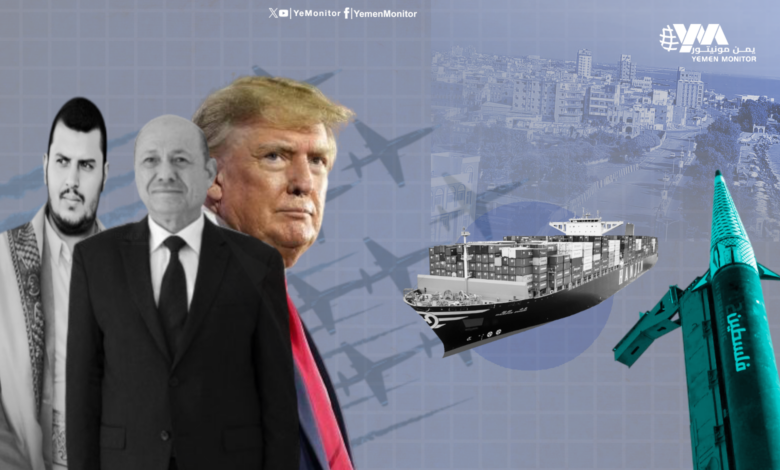
Yemen Monitor/ Istanbul/ Exclusive:
A new report by the Mokha Center for Strategic Studies concluded on Wednesday that the likelihood of a domestically-supported, internationally-backed military escalation against the Houthis is increasing, driven by a US desire to halt Red Sea attacks and demands for a new strategy that addresses Yemeni and Gulf concerns.
Amid the escalating threats posed by the Houthis in the Red Sea, the internationally recognized Yemeni government has called for a new US strategy to confront the growing challenges. Yemeni Ambassador to the United States, Mohammed al-Hadrami, emphasized in a speech before the US Senate that “the existence of a new US strategy on Yemen is crucial to help us defeat the Houthis, restore state institutions, and establish peace.”
According to the Mokha Center, the proposed Yemeni strategy includes designating the Houthis as a terrorist organization, similar to Hezbollah and the Iranian Revolutionary Guard, in addition to supporting government forces to retake the port of Hodeidah and targeting Houthi leaders to dismantle their command structure.
US diplomacy has been noticeably active in the Saudi capital, Riyadh, where a series of meetings with senior officials were held to discuss counterterrorism.
The Yemeni research center indicates that despite the US desire to renew the war against the Houthis, Saudi Arabia is hesitant to participate militarily, conditioning its involvement on the signing of a security partnership agreement with Washington. These reservations reflect Riyadh’s concerns about the security situation and the history of relations with the US, which have seen declines in military support in recent years.
Yemen Monitor previously reported on Saudi Crown Prince Mohammed bin Salman’s conditions to the new US administration, which include a clear strategy for the Yemen conflict and the Red Sea, providing effective US support to counter Houthi attacks, including military and intelligence assistance, the need for continuous coordination between the two to ensure achieving common goals in the region, and a long-term commitment from the US administration to support security and stability in the region.
Operations in Hodeidah
The Mokha Center points out that Hodeidah province will be the focal point of military escalation due to its location on the western coast of Yemen and its central role as a starting point for any military operations against the Houthis. The attacks launched by the Houthis on international shipping have brought renewed attention to the importance of controlling the city.
The report highlights several factors indicating the potential for a military escalation against the Houthis, including: international support, as the US and British positions towards the Houthis have changed following the attacks on shipping; the decline of Iranian influence in the region, due to the collapse of the Syrian regime and the decline of the role of Hezbollah in Lebanon, which enhances the chances of moving against the Houthis with Yemenis aspiring for a scenario similar to what happened in Syria; the Houthis’ intensification of their military reinforcements and fortifications on the front lines in Hodeidah, and their open fears of a military move; and the movement within the internationally recognized government, which indicates the possibility of some development, especially in Hodeidah province and the western coast.
The Yemeni research center points out that the tug-of-war between regional and international powers, and their differing priorities, is a major reason for the long war in Yemen and the stagnation of its situation between peace and war. It calls on “these powers not to miss the available opportunity for their own special considerations, and to take into account the interests of Yemenis as well, especially after the war has lasted longer than it should, and the economic and humanitarian conditions of Yemenis have collapsed.”
The center concludes that the current situation requires “seizing the historical moment to achieve a military and political shift.” It recommends that “the international community support the efforts of the legitimate government in Yemen and provide the necessary assistance for reconstruction and economic development to ensure a lasting peace that preserves the interests of the Yemeni people and the region.”




